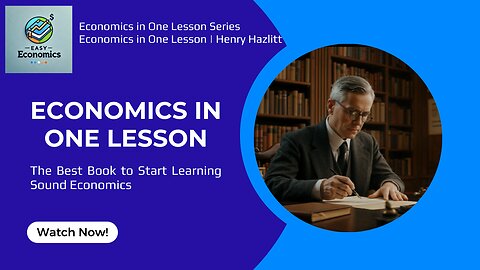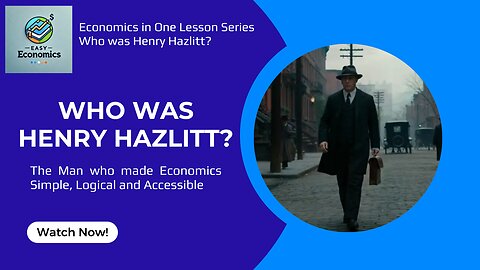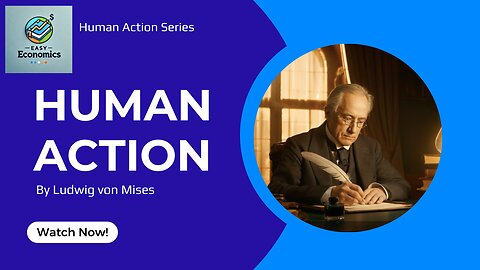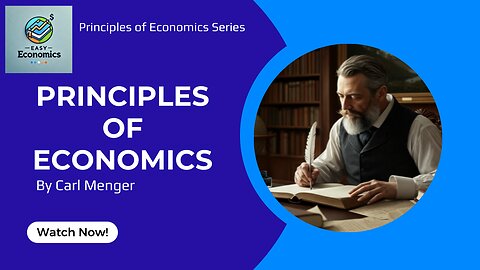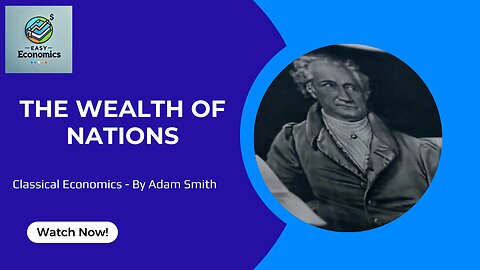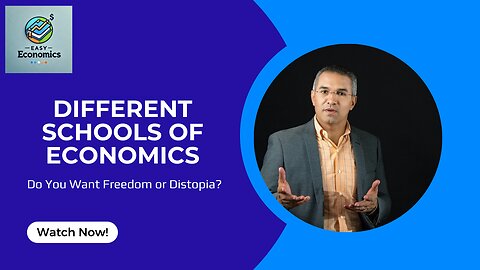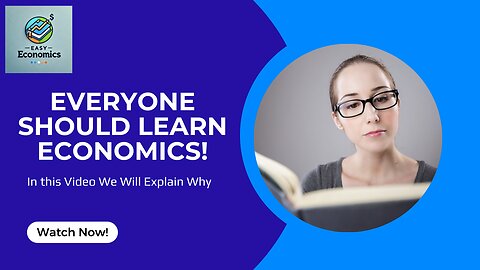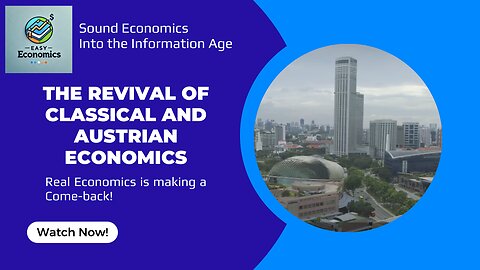
Economics for Everyone
10 videos
Updated 11 days ago
This playlist is designed for beginners looking to understand the basics of economics. It covers the importance of economics in everyday life and explores the different schools of economic thought that shape our world. You’ll also discover some of the best classic economics books, providing a solid foundation for anyone interested in diving deeper into economic theory. Whether you're just starting or looking to refresh your knowledge, this playlist will guide you through the essential concepts that are crucial to understanding how the economy works.
-
The Rise of Sound Economics into the Information Age
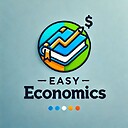 EasyEconomicsIn this video, we explore the four major schools of economics: Marxian, Keynesian, Classical, and Austrian. While Marxian and Keynesian economics dominate modern education and media, they often align with state-driven policies that favor government expansion. On the other hand, Classical and Austrian Economics, often overlooked in mainstream education, offer more logical and real-world applicable theories. We explain why these "sound" economics provide deeper insights into how the world works, often highlighting the economic success and stability seen in countries that follow their principles. As the Information Age challenges traditional media monopolies, there's a rising interest in Classical and Austrian Economics, thanks to the spread of knowledge through social media and online courses. In this video series, we aim to make these powerful ideas more accessible and digestible, helping you understand how sound economics can lead to a more prosperous and peaceful society. 00:00 - Introduction to Economic Schools of Thought 00:23 - Dominance of Marxian and Keynesian Economics 00:49 - The Case for Classical and Austrian Economics 01:38 - The Role of the Internet in Economic Education 02:09 - Our Mission11 views 1 comment
EasyEconomicsIn this video, we explore the four major schools of economics: Marxian, Keynesian, Classical, and Austrian. While Marxian and Keynesian economics dominate modern education and media, they often align with state-driven policies that favor government expansion. On the other hand, Classical and Austrian Economics, often overlooked in mainstream education, offer more logical and real-world applicable theories. We explain why these "sound" economics provide deeper insights into how the world works, often highlighting the economic success and stability seen in countries that follow their principles. As the Information Age challenges traditional media monopolies, there's a rising interest in Classical and Austrian Economics, thanks to the spread of knowledge through social media and online courses. In this video series, we aim to make these powerful ideas more accessible and digestible, helping you understand how sound economics can lead to a more prosperous and peaceful society. 00:00 - Introduction to Economic Schools of Thought 00:23 - Dominance of Marxian and Keynesian Economics 00:49 - The Case for Classical and Austrian Economics 01:38 - The Role of the Internet in Economic Education 02:09 - Our Mission11 views 1 comment -
Economics in One Lesson - The Ultimate Book to Start Learning Sound Economics
 EasyEconomicsDo you want to start learning real economics and get the book ‘Economics in One Lesson’? Get it here: https://amzn.to/41WDZcb Discover the timeless wisdom of Henry Hazlitt’s Economics in One Lesson, a groundbreaking book that has shaped how we think about economic decisions since its publication in 1946. Hazlitt explains core principles like the “Broken Window Fallacy,” teaching us to look beyond immediate effects and consider the hidden, long-term consequences of economic actions. Explore key concepts like opportunity cost—the unseen trade-offs in every decision—and how market prices act as vital signals to allocate resources efficiently. Written in clear, accessible language, Economics in One Lesson simplifies complex ideas, making it an essential read for anyone curious about economics, from beginners to seasoned readers. In today’s world of increasing government intervention, Hazlitt’s defense of free markets and individual liberty is more relevant than ever. Watch this video to learn why Hazlitt’s lessons still resonate and how they can change the way you think about policies and the economy. 00:00 - Introduction to "Economics in One Lesson” 00:56 - The Broken Window Fallacy – Seeing the True Costs of Policy 02:16 - The Importance of Opportunity Cost – What You Give Up 03-09 - The Role of Prices and Markets in Allocating Resources 03:53 - Why "Economics in One Lesson" is Essential Reading12 views
EasyEconomicsDo you want to start learning real economics and get the book ‘Economics in One Lesson’? Get it here: https://amzn.to/41WDZcb Discover the timeless wisdom of Henry Hazlitt’s Economics in One Lesson, a groundbreaking book that has shaped how we think about economic decisions since its publication in 1946. Hazlitt explains core principles like the “Broken Window Fallacy,” teaching us to look beyond immediate effects and consider the hidden, long-term consequences of economic actions. Explore key concepts like opportunity cost—the unseen trade-offs in every decision—and how market prices act as vital signals to allocate resources efficiently. Written in clear, accessible language, Economics in One Lesson simplifies complex ideas, making it an essential read for anyone curious about economics, from beginners to seasoned readers. In today’s world of increasing government intervention, Hazlitt’s defense of free markets and individual liberty is more relevant than ever. Watch this video to learn why Hazlitt’s lessons still resonate and how they can change the way you think about policies and the economy. 00:00 - Introduction to "Economics in One Lesson” 00:56 - The Broken Window Fallacy – Seeing the True Costs of Policy 02:16 - The Importance of Opportunity Cost – What You Give Up 03-09 - The Role of Prices and Markets in Allocating Resources 03:53 - Why "Economics in One Lesson" is Essential Reading12 views -
Who was Henry Hazlitt? - An Austrian Economist Known for Simplicity, Logic and Clarity
 EasyEconomicsAre you interested to learn real sound economics? Henry Hazlitt (especially Economics in One Lesson) is perfect to start with! It’s easy to read and understand and it matches with the real world. Get one of Henry’s books here: https://amzn.to/4fFwAkw Henry Hazlitt was more than an economist—he was a brilliant communicator and a champion of free markets and individual liberty. Born in 1894, Hazlitt’s career as a journalist and writer made him one of the most influential economic thinkers of the 20th century. His magnum opus, Economics in One Lesson, remains a cornerstone for anyone seeking to understand economics in simple, practical terms. Hazlitt’s philosophy was rooted in the Austrian School of Economics, drawing inspiration from Ludwig von Mises and Friedrich Hayek. He fiercely opposed government intervention, inflation, and Keynesian theories, believing that economic freedom was essential for human prosperity. This video explores Hazlitt’s life, his groundbreaking works, and his enduring legacy in promoting economic clarity and sound reasoning. From his critique of Keynesian policies to his advocacy for free markets, Hazlitt’s timeless ideas continue to inspire those seeking to understand the power of individual choice in a free society. 00:00 - Henry Hazlitt – A Champion of Economic Clarity and Individual Liberty 00:07 - Introduction to Henry Hazlitt 01:22 - Early Life and Career of Henry Hazlitt 02:17 - Hazlitt’s Worldview and Philosophy 03:22 - Henry Hazlitt’s Books 05:55 - Hazlitt’s Enduring Legacy8 views
EasyEconomicsAre you interested to learn real sound economics? Henry Hazlitt (especially Economics in One Lesson) is perfect to start with! It’s easy to read and understand and it matches with the real world. Get one of Henry’s books here: https://amzn.to/4fFwAkw Henry Hazlitt was more than an economist—he was a brilliant communicator and a champion of free markets and individual liberty. Born in 1894, Hazlitt’s career as a journalist and writer made him one of the most influential economic thinkers of the 20th century. His magnum opus, Economics in One Lesson, remains a cornerstone for anyone seeking to understand economics in simple, practical terms. Hazlitt’s philosophy was rooted in the Austrian School of Economics, drawing inspiration from Ludwig von Mises and Friedrich Hayek. He fiercely opposed government intervention, inflation, and Keynesian theories, believing that economic freedom was essential for human prosperity. This video explores Hazlitt’s life, his groundbreaking works, and his enduring legacy in promoting economic clarity and sound reasoning. From his critique of Keynesian policies to his advocacy for free markets, Hazlitt’s timeless ideas continue to inspire those seeking to understand the power of individual choice in a free society. 00:00 - Henry Hazlitt – A Champion of Economic Clarity and Individual Liberty 00:07 - Introduction to Henry Hazlitt 01:22 - Early Life and Career of Henry Hazlitt 02:17 - Hazlitt’s Worldview and Philosophy 03:22 - Henry Hazlitt’s Books 05:55 - Hazlitt’s Enduring Legacy8 views -
Human Action - A Masterpiece of Economic Thought by Ludwig von Mises
 EasyEconomicsAre you interested to read the original book? Get ‘Human Action’ by Ludwig von Mises now: https://amzn.to/4fD9zP6 In this video, we explore Ludwig von Mises’ groundbreaking work Human Action—a masterpiece of economic thought from the Austrian School. Mises revolutionized how we understand economics by focusing on individual choices and subjective value rather than abstract systems. He demonstrated that free markets thrive because they reflect the decisions of millions, while centralized systems like socialism fail due to the lack of proper calculation and incentives. We’ll break down core concepts like the power of free markets, the economic calculation problem, and how individual decision-making drives innovation and prosperity. Mises also emphasized that economics is about more than money—it’s about freedom, morality, and human dignity. Whether you’re curious about markets or want to understand the forces shaping the world, this video simplifies Mises’ transformative ideas into bite-sized, easy-to-follow explanations. Join us to discover why Human Action remains essential for understanding both economics and humanity today. 00:00 - Introduction to Human Action 00:36 - Importance of 'Human Action' today 00:57 - Praxeology – Understanding Human Behavior 01:40 - The Power of Free Markets 02:32 - Economic Calculation and Why Socialism Fails 03:12 - Human Action and the Individual 03:46 - Why 'Human Action' is a Must-Read20 views 1 comment
EasyEconomicsAre you interested to read the original book? Get ‘Human Action’ by Ludwig von Mises now: https://amzn.to/4fD9zP6 In this video, we explore Ludwig von Mises’ groundbreaking work Human Action—a masterpiece of economic thought from the Austrian School. Mises revolutionized how we understand economics by focusing on individual choices and subjective value rather than abstract systems. He demonstrated that free markets thrive because they reflect the decisions of millions, while centralized systems like socialism fail due to the lack of proper calculation and incentives. We’ll break down core concepts like the power of free markets, the economic calculation problem, and how individual decision-making drives innovation and prosperity. Mises also emphasized that economics is about more than money—it’s about freedom, morality, and human dignity. Whether you’re curious about markets or want to understand the forces shaping the world, this video simplifies Mises’ transformative ideas into bite-sized, easy-to-follow explanations. Join us to discover why Human Action remains essential for understanding both economics and humanity today. 00:00 - Introduction to Human Action 00:36 - Importance of 'Human Action' today 00:57 - Praxeology – Understanding Human Behavior 01:40 - The Power of Free Markets 02:32 - Economic Calculation and Why Socialism Fails 03:12 - Human Action and the Individual 03:46 - Why 'Human Action' is a Must-Read20 views 1 comment -
Principles of Economics by Carl Menger - The Foundation of the Austrian School
 EasyEconomicsAre you interested to read the original book? Get ‘Principles of Economics’ by Carl Menger now: https://amzn.to/41Te3Ov In this video, we explore Carl Menger’s Principles of Economics, the foundational work of the Austrian School of Economics. Published in 1871, Menger revolutionized economic thought by shifting the focus from production costs to human decision-making. His key ideas, including subjective value and marginal utility, explain how value is determined by personal needs and preferences, not inherent properties. Menger demonstrated that as we consume more of something, its value decreases—this helps us understand why prices fluctuate based on scarcity. He also emphasized the role of individuals in shaping the economy, rather than abstract economic forces. Menger’s groundbreaking work continues to influence modern economics by highlighting the importance of entrepreneurship, choice, and time in economic decisions. Whether you're new to economics or curious about the Austrian School, this video breaks down Menger’s insights into easy-to-understand concepts that remain relevant today. 00:00 - Intro into Principles of Economics by Carl Menger 00:26 - Why Principles of Economics Matter Today 00:46 - Subjective Value – Why Things Are Worth What They’re Worth 01:20 - Marginal Utility – The Key to Understanding Choices 01:54 - The Role of Individuals in the Economy 02:31 - Why Principles of Economics is a Must-Read 02:57 - Conclusion and Further Resources18 views 1 comment
EasyEconomicsAre you interested to read the original book? Get ‘Principles of Economics’ by Carl Menger now: https://amzn.to/41Te3Ov In this video, we explore Carl Menger’s Principles of Economics, the foundational work of the Austrian School of Economics. Published in 1871, Menger revolutionized economic thought by shifting the focus from production costs to human decision-making. His key ideas, including subjective value and marginal utility, explain how value is determined by personal needs and preferences, not inherent properties. Menger demonstrated that as we consume more of something, its value decreases—this helps us understand why prices fluctuate based on scarcity. He also emphasized the role of individuals in shaping the economy, rather than abstract economic forces. Menger’s groundbreaking work continues to influence modern economics by highlighting the importance of entrepreneurship, choice, and time in economic decisions. Whether you're new to economics or curious about the Austrian School, this video breaks down Menger’s insights into easy-to-understand concepts that remain relevant today. 00:00 - Intro into Principles of Economics by Carl Menger 00:26 - Why Principles of Economics Matter Today 00:46 - Subjective Value – Why Things Are Worth What They’re Worth 01:20 - Marginal Utility – The Key to Understanding Choices 01:54 - The Role of Individuals in the Economy 02:31 - Why Principles of Economics is a Must-Read 02:57 - Conclusion and Further Resources18 views 1 comment -
The Wealth of Nations - A Timeless Guide to Prosperity
 EasyEconomicsAre you interested to read the original book? Get ‘The Wealth of Nations’ by Adam Smith now: https://amzn.to/4gtY9ys Why does a book from 1776 still matter today? The Wealth of Nations by Adam Smith is more than a classic—it’s a timeless guide to understanding how societies create prosperity. In this video, we break down Smith’s most influential ideas, like the invisible hand and the division of labor, into simple, easy-to-understand lessons. Smith showed that self-interest, when combined with free markets, naturally benefits everyone. A shoemaker working for profit still helps others by providing shoes. Meanwhile, specialization—focusing on what we do best—makes us more productive and wealthier as a society. These concepts remain at the heart of modern economics and explain why free markets thrive when individuals are free to trade and create value. Curious to learn more? Our video series makes Adam Smith’s ideas clear and relevant for today’s world. 00:00 - Introduction to 'The Wealth of Nations’ 00:48 - The Invisible Hand – How Self-Interest Benefits Everyone 01:46 - Division of Labor – Why Specialization Makes Everyone Richer 02:33 - Why 'The Wealth of Nations' Matters Today11 views
EasyEconomicsAre you interested to read the original book? Get ‘The Wealth of Nations’ by Adam Smith now: https://amzn.to/4gtY9ys Why does a book from 1776 still matter today? The Wealth of Nations by Adam Smith is more than a classic—it’s a timeless guide to understanding how societies create prosperity. In this video, we break down Smith’s most influential ideas, like the invisible hand and the division of labor, into simple, easy-to-understand lessons. Smith showed that self-interest, when combined with free markets, naturally benefits everyone. A shoemaker working for profit still helps others by providing shoes. Meanwhile, specialization—focusing on what we do best—makes us more productive and wealthier as a society. These concepts remain at the heart of modern economics and explain why free markets thrive when individuals are free to trade and create value. Curious to learn more? Our video series makes Adam Smith’s ideas clear and relevant for today’s world. 00:00 - Introduction to 'The Wealth of Nations’ 00:48 - The Invisible Hand – How Self-Interest Benefits Everyone 01:46 - Division of Labor – Why Specialization Makes Everyone Richer 02:33 - Why 'The Wealth of Nations' Matters Today11 views -
Different Schools of Economics Explained - Freedom VS Control
 EasyEconomicsEconomics isn’t just one idea—it’s a debate between different schools of thought. In this video, we break down the major perspectives that shape economies: Classical Economics (free markets and growth), Austrian Economics (freedom and long-term prosperity), Marxian Economics (fairness and anti-capitalism), and Keynesian Economics (government intervention during recessions). While Keynesian and Marxian theories promote intervention, they often lead to stagnation and collapsing economies. Successful nations like Hong Kong, Singapore, and Dubai thrive because of Classical and Austrian principles: free markets, limited government, and individual liberty. These ideas don’t just drive growth—they create freedom and prosperity. We focus on schools of thought that truly reflect reality and produce successful outcomes. If you value freedom and want to understand real economics, this series is for you! 00:00 - Schools of Economics 00:23 - Classical Economics 00:49 - Marxian Economics 01:16 - Keynesian Economics 01:42 - Austrian Economics 02:04 - Freedom VS Interventionism9 views
EasyEconomicsEconomics isn’t just one idea—it’s a debate between different schools of thought. In this video, we break down the major perspectives that shape economies: Classical Economics (free markets and growth), Austrian Economics (freedom and long-term prosperity), Marxian Economics (fairness and anti-capitalism), and Keynesian Economics (government intervention during recessions). While Keynesian and Marxian theories promote intervention, they often lead to stagnation and collapsing economies. Successful nations like Hong Kong, Singapore, and Dubai thrive because of Classical and Austrian principles: free markets, limited government, and individual liberty. These ideas don’t just drive growth—they create freedom and prosperity. We focus on schools of thought that truly reflect reality and produce successful outcomes. If you value freedom and want to understand real economics, this series is for you! 00:00 - Schools of Economics 00:23 - Classical Economics 00:49 - Marxian Economics 01:16 - Keynesian Economics 01:42 - Austrian Economics 02:04 - Freedom VS Interventionism9 views -
Economics and Society - How Economics Drives Society
 EasyEconomicsDid you know that most societal problems—war, poverty, hyperinflation, and even crime—are often man-made, not natural disasters? Many of these issues arise from well-intentioned policies rooted in poor economic understanding. In this video, we explore how bad economics affects everything: from grocery prices to life expectancy, and even art, education, and food quality. The difference between countries like North Korea and South Korea, or oil-rich Dubai and Venezuela, proves one thing: good economic policies lift societies, while bad ones destroy them. Understanding economics isn’t just for academics—it’s crucial for everyone. By learning and sharing economic principles, we can reduce harmful policies and create a better world. Economics is the foundation of society. The more people grasp this, the greater the chances of progress, prosperity, and higher living standards for all. 00:00 - Introduction to Economics and Society 00:11 - Man-Made Problems 00:35 - The Influence of Keynesian Economics 00:48 - The Importance of Economic Knowledge 00:59 - Deep Dive into Societal Issues 01:40 - Proof of Economic Impact 02:14 - Learn and Spread Economics6 views
EasyEconomicsDid you know that most societal problems—war, poverty, hyperinflation, and even crime—are often man-made, not natural disasters? Many of these issues arise from well-intentioned policies rooted in poor economic understanding. In this video, we explore how bad economics affects everything: from grocery prices to life expectancy, and even art, education, and food quality. The difference between countries like North Korea and South Korea, or oil-rich Dubai and Venezuela, proves one thing: good economic policies lift societies, while bad ones destroy them. Understanding economics isn’t just for academics—it’s crucial for everyone. By learning and sharing economic principles, we can reduce harmful policies and create a better world. Economics is the foundation of society. The more people grasp this, the greater the chances of progress, prosperity, and higher living standards for all. 00:00 - Introduction to Economics and Society 00:11 - Man-Made Problems 00:35 - The Influence of Keynesian Economics 00:48 - The Importance of Economic Knowledge 00:59 - Deep Dive into Societal Issues 01:40 - Proof of Economic Impact 02:14 - Learn and Spread Economics6 views -
Economics for the Individual - How Economics Empowers You
 EasyEconomicsGet the book ‘Secrets of a Millionaire Mind’ now: https://amzn.to/49Veaeh Get the book ‘Think and Grow Rich’ now: https://amzn.to/4a0qSsf Did you know understanding economics can change your life? Economics isn’t just about markets and policies—it’s a roadmap to personal empowerment. When you understand economic principles, you gain the ability to make better decisions, foresee outcomes of political or monetary shifts, and position yourself for success. Economics teaches you about value creation. In a free market, wealth comes from enriching others’ lives. Contrary to popular belief, getting rich isn’t selfish—it’s proof you’ve provided value to society. This knowledge frees you from feeling shame about success and allows you to enjoy it guilt-free! We’ll also explore how economics helps you make moral decisions, fostering prosperity for yourself and others. Whether you want to succeed financially or simply understand the mechanisms of society, learning economics is the key. 00:00 - Economics and the Individual 00:10 - Empowerment through Economics 00:18 - Practical Benefits of Understanding Economics 00:40 - Predicting Outcomes and Profiting 01:01 - Economics and Morality 01:23 - Economic Knowledge and Wealth 01:36 - The Value of Wealth in Society 01:58 - Pride in Wealth and Overcoming Shame 02:31 - Conclusion7 views
EasyEconomicsGet the book ‘Secrets of a Millionaire Mind’ now: https://amzn.to/49Veaeh Get the book ‘Think and Grow Rich’ now: https://amzn.to/4a0qSsf Did you know understanding economics can change your life? Economics isn’t just about markets and policies—it’s a roadmap to personal empowerment. When you understand economic principles, you gain the ability to make better decisions, foresee outcomes of political or monetary shifts, and position yourself for success. Economics teaches you about value creation. In a free market, wealth comes from enriching others’ lives. Contrary to popular belief, getting rich isn’t selfish—it’s proof you’ve provided value to society. This knowledge frees you from feeling shame about success and allows you to enjoy it guilt-free! We’ll also explore how economics helps you make moral decisions, fostering prosperity for yourself and others. Whether you want to succeed financially or simply understand the mechanisms of society, learning economics is the key. 00:00 - Economics and the Individual 00:10 - Empowerment through Economics 00:18 - Practical Benefits of Understanding Economics 00:40 - Predicting Outcomes and Profiting 01:01 - Economics and Morality 01:23 - Economic Knowledge and Wealth 01:36 - The Value of Wealth in Society 01:58 - Pride in Wealth and Overcoming Shame 02:31 - Conclusion7 views -
Economics for Everyone - Why Everyone Should Learn Economics
 EasyEconomicsWhy should you care about economics? Isn’t it just for academics and experts? Absolutely not! In this video series, we’ll show you how the basics of economics can be simple, intuitive, and directly connected to your everyday life. Economics is the foundation of all human interactions and society itself. By learning its principles, you can improve your personal decision-making and help society tackle its biggest challenges. We believe that a lack of understanding of basic economics causes most of the problems in the world today. That’s why we’re creating easy-to-understand videos about core economic ideas, schools of thought, and summaries of key economic books. Start your journey into the world of economics and see how this knowledge can change your life and society for the better. If you’re ready to learn more, hit the like button, subscribe, and check out the next video in the series! 00:00 - The Importance of Economics 00:17 - Why Economics? 00:36 - Economics is for Everyone 01:10 - Economics and Society 01:31 - What to Expect in This Series 01:55 - Conclusion8 views
EasyEconomicsWhy should you care about economics? Isn’t it just for academics and experts? Absolutely not! In this video series, we’ll show you how the basics of economics can be simple, intuitive, and directly connected to your everyday life. Economics is the foundation of all human interactions and society itself. By learning its principles, you can improve your personal decision-making and help society tackle its biggest challenges. We believe that a lack of understanding of basic economics causes most of the problems in the world today. That’s why we’re creating easy-to-understand videos about core economic ideas, schools of thought, and summaries of key economic books. Start your journey into the world of economics and see how this knowledge can change your life and society for the better. If you’re ready to learn more, hit the like button, subscribe, and check out the next video in the series! 00:00 - The Importance of Economics 00:17 - Why Economics? 00:36 - Economics is for Everyone 01:10 - Economics and Society 01:31 - What to Expect in This Series 01:55 - Conclusion8 views
